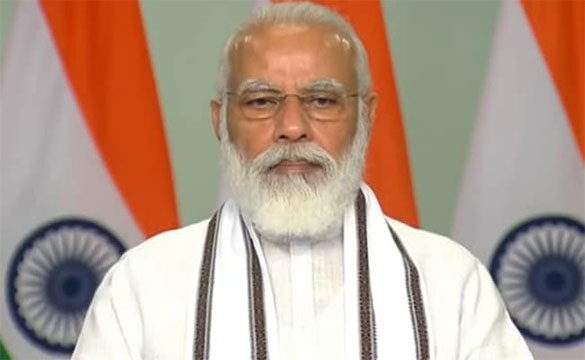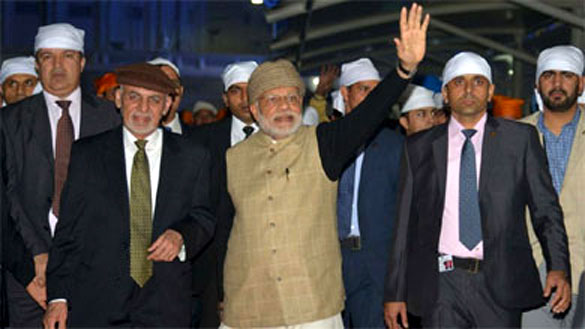PM Modi at AMU: Concrete Action Should Follow Laudable Thoughts

By
Arshad Alam, New Age Islam
24 December
2020
Thanks to
the concerted effort of the Hindu right wing, the Aligarh Muslim University is
now considered as the hub of ‘anti-national’ activities. Like many other
centres of learning, AMU has a complicated past. There is no denying the fact
that the university became the ideological launch pad of the Pakistan movement.
But then, that is not the only legacy of this hallowed centre of education.

There were
nationalist currents within the university which ultimately led to the
establishment of Jamia Millia Islamia University, first within the campus of
AMU and later in Delhi. Post-independence, AMU has had its share of left and
right wingers, with the balance of power shifting on one side from time to
time. Again, this is not different from other campuses elsewhere. And yet, AMU
has always been seen ‘suspiciously’, not just by the current political
disposition but also by previous governments. One is not just reminded of the
SIMI raids on the campus during the 1990s, but also how the whole university was
painted as if it was geared only towards producing Islamic radicals. One also
remembers how the students then dreaded the provincial armed constabulary
(PAC), a rather thuggish force created by the Congress party in Uttar Pradesh.
Blatantly communal, PAC was regularly deployed on the campus to ensure the
‘safety’ of students.
One also
remembers the recent right wing attack on the institution for having a portrait
of Jinnah in its students’ union office. If nuance has any place in history,
then there is no problem in saying that Jinnah is as much part of the history
of AMU as are Gandhi and Nehru. But then, who cares for nuance these days. The
battle lines are drawn: either you are a nationalist and hence a Jinnah hater
or an anti-national Jinnah lover. The government, aided and abetted by the
media, proved to its satisfaction that AMU was anti-national. The subsequent
police crackdown on students who were protesting against the CAA-NRC only added
to the popular impression that the government was dealing appropriately with an
anti-national university.
It will be
interesting to see how the rank and file of the Hindu right wing react now that
the prime minister of the country has hailed AMU as nationalist. It will become
exceedingly difficult now for such minions to brand the institution as the hub
of anti-national activities.

Against
such a background, Prime Minister Narendra Modi being the chief guest at AMU’s
centenary celebration baffled many observers. Modi spoke of the university’s
contribution to the national movement, its powerful alumni network and their
contribution to India’s progress and reminded AMU of Sir Syed’s dictum that the
community’s and the nation’s progress were interlinked. More importantly, he
laboured that his vision for a new idea was inclusive where there was no room
for discrimination against religious minorities. There was a remarkable absence
of any acerbic tone which has come to be associated with the ruling BJP
whenever the party speaks on the Muslim question. It appeared that the prime
minister wanted to extend a hand of solidarity and friendship to Muslims
through AMU. But then many questions remain as to why he was ‘compelled’ to do
so.
Analysts
have argued that this was nothing but a PR exercise by the prime minister to
bolster his sagging image in the international community with Indian Muslims
under relentless attack from the Hindu right wing. It is true that India has
been receiving considerable bad press in the international media but the
assumption that this might hurt India’s interest in any way is largely
unfounded. As a huge market, India has the potential to withstand any criticism
from the international community. We must remember that despite what is
happening to Muslims in China, there has been no international censure of that
country. Why should the world behave differently when it comes to the
persecution of Indian Muslims? Moreover, over the years, Modi government has
put great effort in wooing the Arab states and their silence on many issues
concerning Indian Muslims is proof that they hardly care about what is
happening here. Even if international considerations played a role, it must not
be the only reason why the prime minster chose to speak at AMU. Thus it appears
that the outreach to AMU must have been made for domestic considerations also.
The prime
minister struck all the right notes when he said that there should be no
discrimination on the basis of religion; that everyone irrespective of
religious affiliation should partake of India’s development. However, coming in
the wake of recent laws which have the express intention of putting Muslim
lives in jeopardy, such pious utterances will ring hollow if not backed by
concrete actions on the ground. If the prime minister is really sincere in his outreach
to the Muslim community, then he should do something about the nefarious ‘love
jihad’ law in Uttar Pradesh and the ‘cow protection’ law enacted in many states
ruled by his party. These laws have been designed to make Muslims, especially
Muslim men, insecure in their own country. The prime minister lauded his
government’s measures to ameliorate the condition of Muslim women, but they can
hardly be happy if their men are being treated as second class citizens in
their own country.
A section
of Muslims, especially those who have largely treated AMU as their political
launch pad, are riled that the university authorities decided to invite the
prime minister. They have argued that given the treatment of Muslims during
this government, AMU should not have done so. This sentiment is understandable
but we also need to realise that AMU is a centrally funded university. As such,
it is extremely difficult to say for sure whose idea it was to have the prime
minister as the chief guest; it could have come from outside the university
also. Moreover, Sir Syed himself wold not have shied away from inviting the
prime minister had he been alive. Part of the politics of the founder of AMU
was that minorities should be close to the government, irrespective of its
ideological affiliation. Despite the heavy repression on Muslims by the British
in the aftermath of the 1857 revolt, Sir Syed chose to engage with the same
government later on. Muslims today should similarly engage with the government
at every given opportunity. For whatever reason, the prime minister has made a
good gesture by choosing to speak at AMU. It remains to be seen whether his
words are taken seriously by those who are charged with implementing his vision
of a new and inclusive India.
------
Arshad
Alam is a columnist with NewAgeIslam.com
URL: https://newageislam.com/islam-politics/pm-modi-amu-concrete-action/d/123867
New Age Islam, Islam Online, Islamic Website, African Muslim News, Arab World News, South Asia News, Indian Muslim News, World Muslim News, Women in Islam, Islamic Feminism, Arab Women, Women In Arab, Islamophobia in America, Muslim Women in West, Islam Women and Feminism
